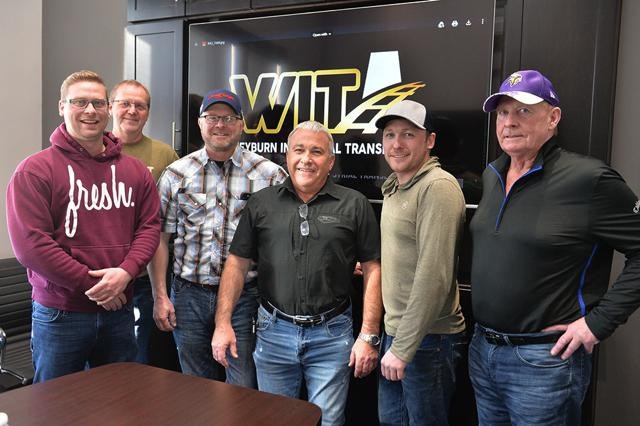By Brian Zinchuk, Pipeline News
There once was a time where you could load and unload rail cars at almost any siding and in every town on the Canadian prairie. Not these days. The days of plentiful local loading sites are long gone.
That even includes Weyburn, a community so synonymous with rail, it used to have a roundhouse on the Soo Line, which is now the Canadian Pacific mainline which connects Western Canada to the American Midwest.
And that’s why a group of partners from southeast Saskatchewan has come together with the intention of building the Weyburn Industrial TransLoad. They intend on building a rail transloading facility on the south edge of Weyburn. In a way, it’s back to the future.
Those partners include Blair Stewart and Carter Stewart, (president and general manager of operations and business development, respectively), Dale Mainil, Calvin Tracey and Jason LeBlanc.
If those names sound familiar, it’s because all but Carter Stewart were the key organizers of last year’s truck convoy to Regina. The convoy and subsequent rally protested the federal government’s policies on energy, carbon tax, as well as how they affect agriculture. Now, they’ve come together to do something they see as a strong positive – local Saskatchewan investors wanting to build local infrastructure.
The Stewart name is also synonymous with rail, having built up Stewart С����Ƶern Railway, a shortline from Stoughton to just outside of Regina. While still shareholders, as of last summer for Blair, and Jan. 1 for Carter, they are no longer involved it in its operation. They bring with them insight for markets they’ve identified for their new facility, as well as deep operational experience.
LeBlanc joins the team with substantial networking experience in a global market, coming from his decades of experience as an auctioneer with his own firm then Ritchie Bros.
That facility is on land owned by the Mainils on the west side of Weyburn. The existing Canadian Pacific Radville subdivision splits off the mainline near Weyburn’s McDonalds restaurant. That line, which sees little use these days other than rail car storage, is key. The new facility would be on that line, south of the ethanol plant.
The investment is substantial, but the partners declined to say how much.
The initial plan is for two “ladder tracks” parallel to the existing line of 3,000 feet (914 metres) each (railways use Imperial measurement). That’s room for approximately 30 cars per track, 60 in total, depending on the length of the cars.
But from there, their plans have multiple possible configurations. Some include multiple spurs. Another option includes a loop track, or multiple loop tracks. Expansion would be driven by market demand, but Mainil noted they have lots of room available.
Carter Stewart emphasized the importance of freight rates. Due to its proximity to the mainline, WIT, as they are calling it, qualifies for mainline rates. That is a significant savings for clients.
Asked what products they wish to handle, Carter Stewart explained they intend on starting with aggregates – sand, rock and gravel, to be trucked in from within the region. Petroleum products are next, with Stewart referring to “refined products.” However, crude-by-rail is also С����Ƶ considered. Agricultural products are also on the list.
But their eyes are to the horizon, literally, on what can be done. “We are in the market to bring in wind turbines,” Carter Stewart said.
The project was initiated last July, when an open house was held for their zoning application. The projects’ regulatory approvals, from zoning to Transport Canada, are each at advanced stages. Dale Mainil, who, with his brother-in-law Tracey and other brother Dennis, own and operate Jerry Mainil Ltd., is planning to start scratching dirt in May, if things come together. And as one of the largest dirt-moving outfits in the region, they have the iron and manpower to do it, especially during spring breakup, when activity in the oilpatch slows.
Carter Stewart noted there is pent-up demand for the scrapping of old rail cars. He pointed out that there’s only one other company doing it in Western Canada, and it’s in Manitoba. There’s a need to scrap 15,000 rail cars in North America, he noted.
The obvious destination for the steel would be EVRAZ Regina, where much of the steel is turned into pipeline pipe. He noted that as it’s hard to get track space in Regina, Weyburn is a good alternative for a scrapping operation.
They also could provide a site for minor repairs of rail cars. Those that can’t be repaired economically could then be scrapped.
As for crude-by-rail, Blair Stewart said, “We’re interested. We’re in the heart of oil country.”
There are lots of opportunities. LeBlanc pointed out that products that you couldn’t ship by rail before, locally, could get onto rail with the completion of their facility.
They could even bring in pumpjacks or cement bases for pumpjacks, Carter offered.
Blair Stewart said grain is on the “lower end of the scale” right now for WIT. “Today our focus is not to compete against the elevators,” he said.
Indeed, the whole project is intended to work in partnership with Canadian Pacific.
As for employment, it would start with one person, but Blair Stewart said three to four would likely be employed in the near future, and as many as 25 down the road, if things play out.
“If anyone is interested in transloading opportunities, call Carter,” said Blair Stewart.




